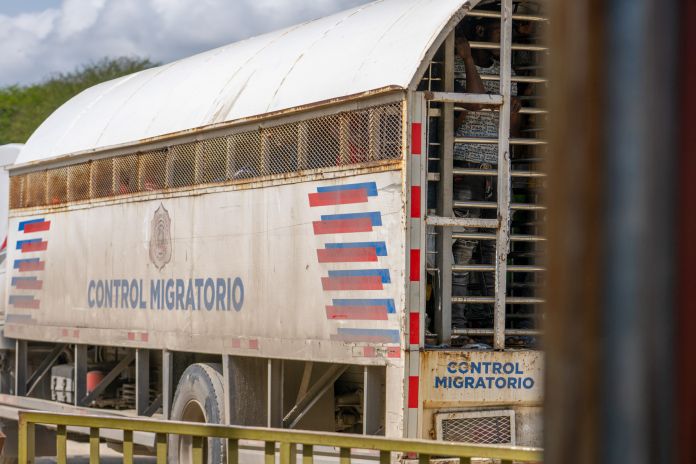By Antoine Lemonnier, IOM Haiti Communications Officer
At 35 years old, Mireille stood under the relentless Haitian sun, clutching a small bag with all that was left of her belongings. Pregnant and exhausted, she had just been deported from the Dominican Republic – a country she had called home since she was eight years old. Haiti, the land of her birth, has been an unfamiliar terrain her whole life. From afar, she saw her of origin decline in gang violence, economic meltdown and crises within crises.
“I was deported to a country I never lived in,” she says, filled with a mix of anger and despair. The Dominican Republic had been her home for nearly three decades. It was where she built her life, forged relationships, and created memories. But overnight, she became an outsider, stripped of her dignity and forced into an unknown reality.
Mireille’s ordeal began in the early hours of the morning, five days before she crossed the border into Haiti when she was taken to a detention centre, where she stayed for several days before being transported to the border.
At the detention centre, Mireille describes the conditions as crowded and uncomfortable. Pregnant and without immediate access to medical care, she felt overwhelmed with concern for her unborn child and her family’s future.
Her children, who remained in Santo Domingo, were suddenly unable to continue attending school. “Education in the Dominican Republic wasn’t perfect,” she reflects, “but it was still better than what I expect in Haiti, where resources are limited.” The disruption to their education and the uncertainty about what lay ahead weighed heavily on her.
“I arrived in Haiti feeling scared and unsure of what to do,” Mireille says. “I barely know this country, and I’m struggling to figure out where to start. It’s disorienting and difficult.”

Arrival and support at GARR
When Mireille finally crossed the border, she was directed to the Support Group for the Repatriated and Refugees (Groupe d’Appui aux Rapatriés et Réfugiés, GARR) centre, a vital space where vulnerable deportees are met and supported. GARR, a key partner of the International Organization for Migration (IOM), works tirelessly to address the immediate needs of deported migrants. For Mireille, this was her first step toward regaining a sense of safety.
At the centre, Mireille was welcomed by staff who offered her a listening ear and a warm meal. IOM, in partnership with GARR, provides a range of services at the centre, including psychosocial support, health referrals, and distribution of basic items. For Mireille, mental health care became a lifeline.
“The psychosocial support brought me much relief,” she shares. “It helped me through the most painful moments.”
In addition to emotional support, IOM also ensured that Mireille and other vulnerable deported migrants get access to critical personal items to support her basic needs such as clothing, hygiene products, and toiletries.
The GARR centre, supported by IOM, serves as a temporary accommodation for the most vulnerable, offering them a place to rest and organize themselves before moving forward with their lives. For many deportees like Mireille, this provides a glimpse of quiet in the midst of despair.
A strong safety net
Mireille’s journey through the reception process also highlights the collaboration between IOM and the Office national de la Migration (ONM), Haiti’s government agency for migration. ONM leads the registration process for deportees, ensuring that each individual is accounted for. At the border, IOM and ONM work hand in hand to assess vulnerabilities and provide tailored assistance.
For pregnant women like Mireille, IOM facilitates access to prenatal care through medical referrals. For unaccompanied children, the Organization facilitates family reunifications. In cases of gender-based violence, IOM and its partners provide survivors with specialized care.
These collaborative efforts – between ONM, GARR, and IOM – create a safety net for migrants who arrive in dire conditions, yet much more is needed. The life-saving assistance provided to deported migrants like Mireille is made possible through the support of international donors, including the European Union’s Civil Protection and Humanitarian Aid Operations (ECHO), Global Affairs Canada (GAC), and the Korea International Cooperation Agency (KOICA).
From psychosocial support and medical referrals to the distribution of hygiene kits and other assistance, these contributions ensure that the most vulnerable migrants are met with dignity and care upon their return. A difficult return.
*Names have been altered. All individuals in the photos were informed of their purpose and gave their consent.





